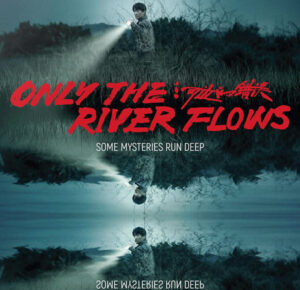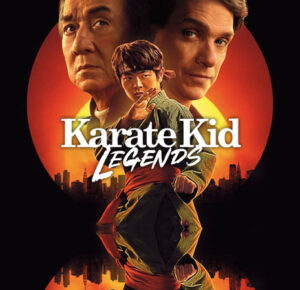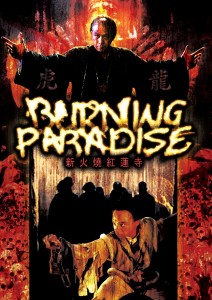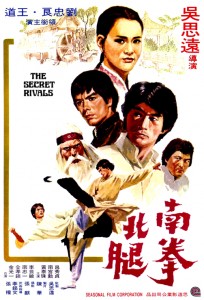Director: Kim Ki-Duk
Writer: Kim Ki-Duk
Producer: Harry Lee, Seung-Soo Shin
Cast: Jin-mo Ju, Jin-ah Kim, Min-seok Son, Je-rak Lee, Ki-yeon Kim, Sun-mi Myeong
Running Time: 83 min.
By Mighty Peking Man
I’m currently on a “Ki-du Kim” natural high. I love his unorthodox style of filmmaking, his morbid approach to storytelling and his fascination with toying with viewers’ minds using uncanny visuals. Ki-duk Kim is definitely on the verge – if not already – of becoming one of the craftiest filmmakers of our time. He’s Korea’s answer to a subtle Takashi Miike, he’s a hint of Hong Kong’s Wong Kar-Wai, and shares a common mental image with Hollywood names like Paul Schrader and Abel Ferrara (at Abel’s best, that is.). No one really knows what to expect when watching his films, yet, they all have one thing in common – they’re not easy to watch. Mind you, I’ve only seen a few of his films: “Bad Guy”, “The Isle” and now “Real Fiction”, the subject of this review.
Jin-mo Ju (outstanding actor from “Musa”) plays a quiet, estranged sketch artist who makes a living by drawing people for money, mostly in busy parks where loads of people are having a good time with friends and family. For some unexplained reason, he wears a headset that is somehow capturing the reception of a pay phone near by. This allows him to hear conversations – good and bad – between two people. Perhaps, this is his way of experiencing something that’s missing from his loner-lifestyle? The artist barely speaks, never smiles, and shows no emotion other than his stone-faced image of someone that’s in low-spirits. And, the fact that a mysterious lady with a camcorder is filming him, non-stop, doesn’t make the guy any happier.
However, the artist has more to worry about than the lady with camcorder. He’s constantly bullied. Not only by local gangs taking his earnings, but by customers who aren’t satisfied with their finished portraits. “That doesn’t really look like me, so I’ll just give you half of what I owe you”, says one man. Another person decides to pay him, but throws the money on the ground. Meanwhile, that lady with the camcorder is still filming…
The artist is about to explode.
“Real Fiction” is a movie about revenge and self-respect. More importantly, it’s about what it would take for one to accomplish such acts; or how someone can spark off one’s inner-psychotic behavior. It’s violent, vividly obscene and abstract. As straight-forward as the plot may sound, don’t be expecting a linear ride. Without giving anything away, “Real Fiction’s” ending could easily make or break how you really feel about the film – or better yet, it might give you something to discuss.
“Real Fiction” was supposedly shot in a single afternoon, using the most conventional tactics of guerrilla filmmaking. Know this, only adds to the film’s productive quality.
Mighty Peking Man’s Rating: 7/10
By Numskull
“Brood for decades – pure hate distilled, Then bottled up much longer; Revenge: a draught I’ll serve you chilled When time has made it stronger.”
– Skyclad, “Vintage Whine”
After watching this movie for just a few minutes, it becomes quite clear that it was shot on very little money over a very short period of time. And you know what? It kicks ass. Real Fiction is a shining example of the greatness that low budget film making can achieve.
File the plot under “so simple it’s brilliant”: a taciturn young sketch artist (whose only form of respite is listening in on other peoples’ phone conversations), at the beginning of what looks like it’s going to be the latest in a long run of shitty, miserable days, encounters a girl who nonchalantly hangs around him with a camcorder and a man in an otherwise abandoned theater who seems to know everything about his life and stirs up some painful memories. Enraged and strangely empowered by his meeting with this odd couple, he sets off on a quest to liberate himself from the huge amounts of anger and frustration built up inside him. Camera girl follows him, not saying a word, recording his every move for reasons about which he neither knows nor cares.
And that’s pretty much it.
Beautiful.
Real Fiction is a “love it or hate it” movie if ever there was one. Some will find it unbearably silly/petty (not to be confused with Silly Putty) while others, like myself, will grin like Pee Wee Herman in a porno theater as the nameless artist slakes his burning-like-the-deepest-pits-of-Hell thirst for revenge; revenge to which, in most cases, he is definitely entitled. Most of the characters in Real Fiction are assholes of the first water, and its protagonist, besides getting some long overdue payback on those who have wronged him, is also lashing out at the human race’s casual attitude about petty, everyday acts of cruelty, rudeness, and degradation…an attitude that has plagued our wretched species since Day One.
Cinematographer Cheol-hyeon Hwang had the easiest job in the world. There are only a handful of cuts and angles and most of the shots are as long as your arm. This, plus the noticeable lack of music in many scenes and the fact that most of the film takes place in real time, adds to the oddball, documentary-style sense of reality. While the main camera tends to remain motionless, camera girl’s somewhat unsteady hand (relax, it ain’t The Blair Witch Project) sometimes moves with imperfect timing, further increasing the film’s overall realism.
Jin-mo Ju is excellent as the unnamed sketch artist, simultaneously meek but stoic at first, then haunted and singularly possessed. His vacuous stare is essential in establishing his character’s broken spirit and aura of low self-esteem and emotional numbness. There are noteworthy performances amongst the supporting cast as well, especially the actress who plays the woman in the comic book shop (actually more like a pay ‘n’ read library than a shop…that sucks).
Three minor flaws mar this excellent movie. (Partial spoilers ahead, especially flaw #2.)
The first is an easily overlooked continuity error: when the guy who’s fucking the artist’s girlfriend walks out of the flower shop she works in, he leaves his cell phone behind and then calls it, indicating that she should hang on to it for the time being. Problem: he’s only been gone for a minute or so. Wouldn’t it have been easier for him to just go back and retrieve it? Yes, but oh well.
The second is the scene where the artist kills the guy who works at Super Viagra by putting a bag of snakes over his head. The guy holds onto the bag as though his life depended on it, when, in fact, his life depends on getting it the fuck OFF. Lame.
The third flaw may not be a flaw at all depending on how you interpret the movie’s perplexing conclusion; the film takes a rather bizarre new path in its last few moments and finishes with a very big, albeit weird, surprise ending. All that I’ll say about it is that it has to do with the angles from which Camera Girl shoots. You may very well notice it yourself while watching the movie, but wait until all is said and done before you pass judgment.
I also have gripes with the DVD itself, but it’s important to separate a work of art from the means through which we may experience it. The package says that Real Fiction is 95 minutes long. It lies. IT LIIIIIIIES!!! The film clocks in at just 82 minutes and change, and feels even shorter than that. Also, the picture is full frame only, and whoever was in charge of the transfer from the theatrical aspect ratio made some poor decisions about what should be trimmed from the screen. Last but not least, the cast and crew information is only in Korean, even though the menu is in English.
An utterly superb “little” movie that you can show to your less worldly friends to show them how superior your tastes are (and if any of them says “Well, shit, this is just people talking, the camera doesn’t even move, what a waste of time” then sever all ties with them immediately). The film is very easy to follow and the subtitles contain far fewer errors than most Hong Kong DVDs. Hats off to (almost) everyone involved; Real Fiction delivers more entertainment than just about any obscenely-budgeted, self-proclaimed “blockbuster” you can name.
Numskull’s Rating: 9/10























Be the 1st to Comment